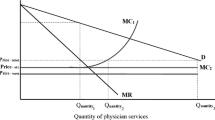Abstract
We examine the effect of managed care contracting on physician labor supply for office-based medical practices. We extend the standard labor supply model to incorporate choices regarding the patient base. Empirical tests use data from the 1985 and 1988 national HCFA Physician Practice Costs and Income Surveys and InterStudy Managed Care Surveys. We use physician-level information on participation in managed care contracting to estimate changes in work hours. Managed care contracting is generally associated with lower physician work hours. However, accounting for motivations to participate in contracts and the extent of contracting, the effect on hours is reduced in magnitude and significance. We conclude that relying on broad aggregate measures for policy analysis will likely be misleading as underlying motivations and contracting incentives change over time.
Similar content being viewed by others
References
Baker, L. et al. (1997). “Managed Care Contracting and Physician Behavior. ” Unpublished manuscript, Carnegie-Mellon University.
Born, P. and C. J. Simon. (1997). “The Influence of Managed Care on the Distribution of Physician Income, 1986-1995: An Application of Quantile Regression. ” Unpublished manuscript, University of Connecticut.
Brown, D. M. and H. E. Lapan. (1979). “The Supply of Physicians’ Services. ” Economic Inquiry 17, 269-279.
Bureau of Labor Statistics. (1997). “Employee Benefits in Medium and Large Private Industry Establishments. ” New Release USDL 97-247.
Emmons, D. and C. J. Simon. (1994). “Recent Trends in Managed Care. ” In Socioeconomic Characteristics of Medical Practice. Chicago: American Medical Association.
Mitchell, J. M. and J. Hadley. (1999). “Effects of Managed Care Market Penetration on Physicians’ Labor Supply Decisions. ” Quarterly Review of Economics and Finance 39, 491-511.
Phelps, C. (1997). Health Economics, second edition. New York: Harper Collins.
Showalter, M. and N. K Thurston. (1997). “Taxes and the Labor Supply of High Income Physicians. ” Journal of Public Economics 66, 73-97.
Simon, C. J., D. Dranove and W. D. White. (1998) “The Effect of Managed Care on the Incomes of Primary Care and Specialty Physicians. ” Health Services Research 33, 549-569.
Thurston, N. K. (2000). “Physician Behavioral Responses to Variation in Marginal Income Tax Rates: Longitudinal Evidence. ” Unpublished manuscript, Brigham Young University.
Author information
Authors and Affiliations
Rights and permissions
About this article
Cite this article
Libby, A.M., Thurston, N.K. Effects of Managed Care Contracting on Physician Labor Supply. International Journal of Health Care Finance and Economics 1, 139–157 (2001). https://doi.org/10.1023/A:1012826611323
Issue Date:
DOI: https://doi.org/10.1023/A:1012826611323



